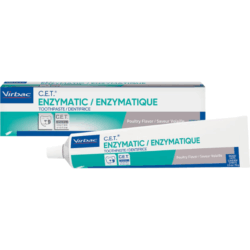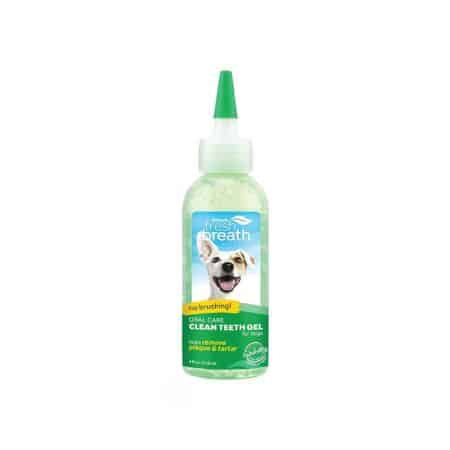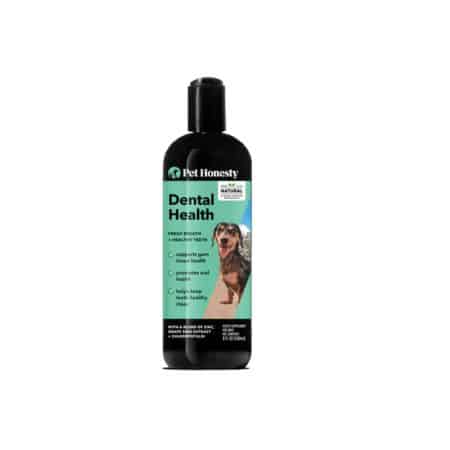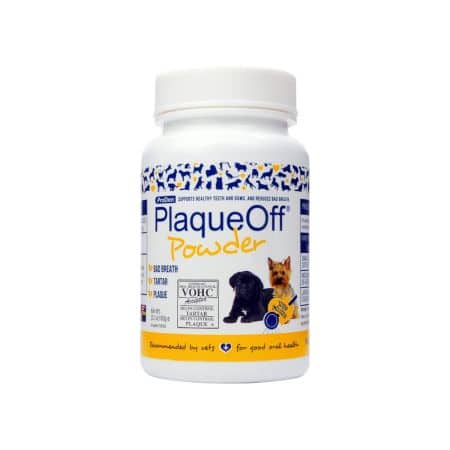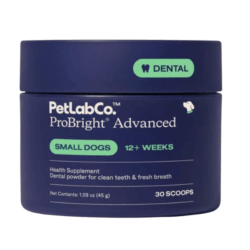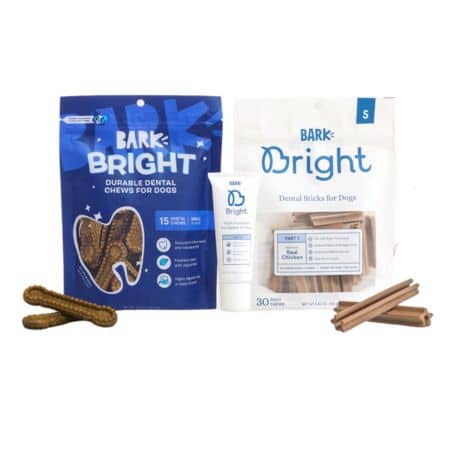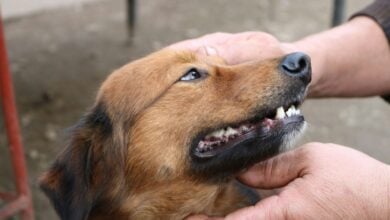Breaking Bad Breath: How To Fix Your Dog’s Stinky Mouth (For Good)
When you purchase through links on our site, we may earn a commission. Here’s how it works.
If your dog’s kisses could strip paint, you’re not alone.
Table of Contents
Bad breath is one of the most common and most revolting dog complaints. The good news is that it’s fixable. Here’s how to turn your pup’s toxic fumes into fresh puppy breath again.
3 Reasons Why Your Dog’s Breath Smells So Bad
Every dog gets a little morning breath, but if your pup’s kisses could clear a room, something else is going on. Bad dog breath isn’t just unpleasant; it’s usually a sign that bacteria are throwing a party somewhere in your dog’s mouth or gut.
1. The Food Factor
Sometimes the culprit is as simple as diet. Low-quality kibble, table scraps, or stuck bits of food between teeth can cause odor within hours.
Dogs that snack on trash or poop (yes, it happens) can pick up smells that would make a skunk blush.
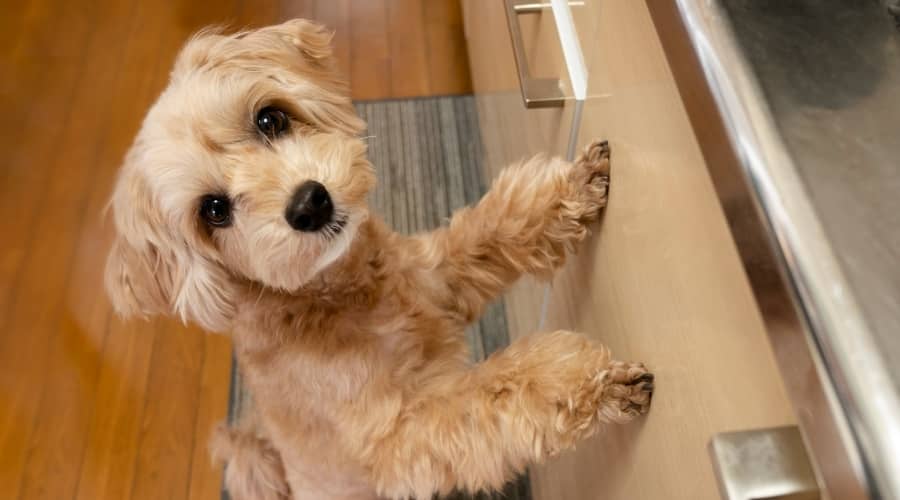
Fix it: Switch to high-quality food, check for stuck debris, and clean bowls daily.
2. The Dental Disaster Zone
If your dog’s mouth smells like something died, dental disease is the most likely cause.
Plaque hardens into tartar, the gums become infected, and bacteria multiply rapidly. More than 80 percent of dogs over the age of three show signs of dental disease, and bad breath is often the first indication.
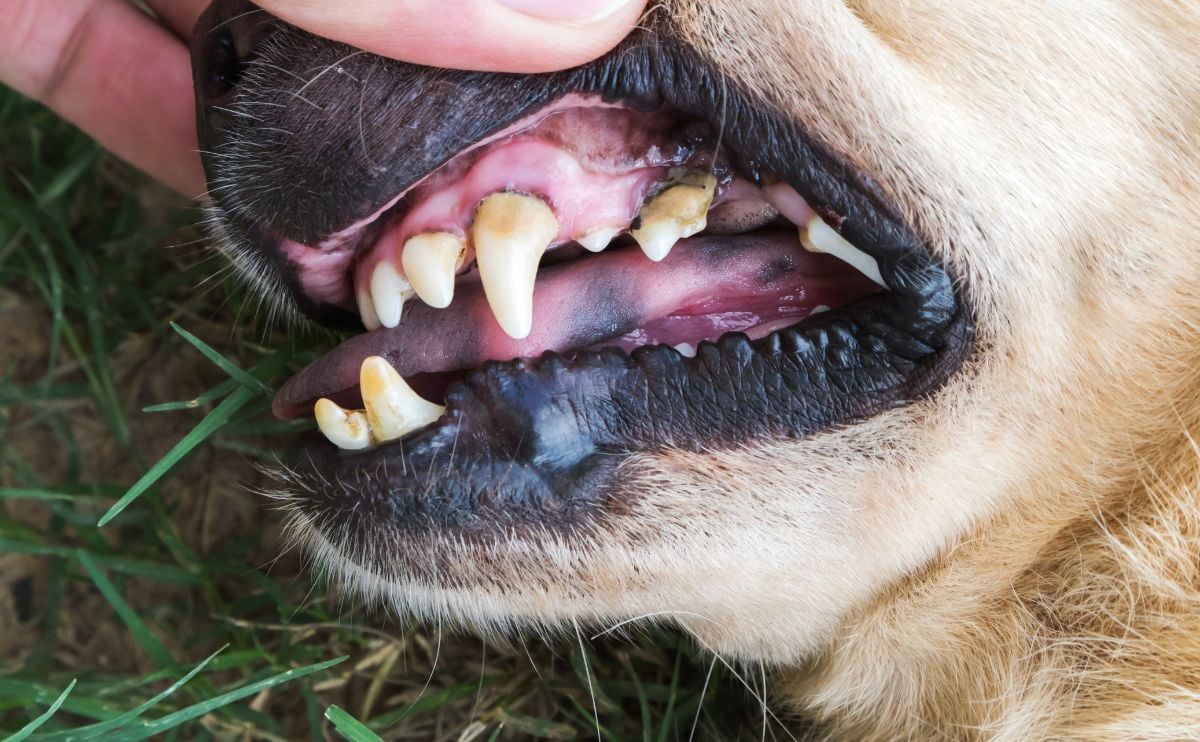
Fix it: Regular brushing, vet cleanings, and dental chews help remove buildup before it becomes painful.
3. The Hidden Health Issues
When brushing and diet changes don’t help, the odor might be coming from deeper inside.
Kidney problems can create a metallic or ammonia-like smell, while liver disease can give off a sour, rotten scent. Diabetes sometimes adds a strangely sweet odor.
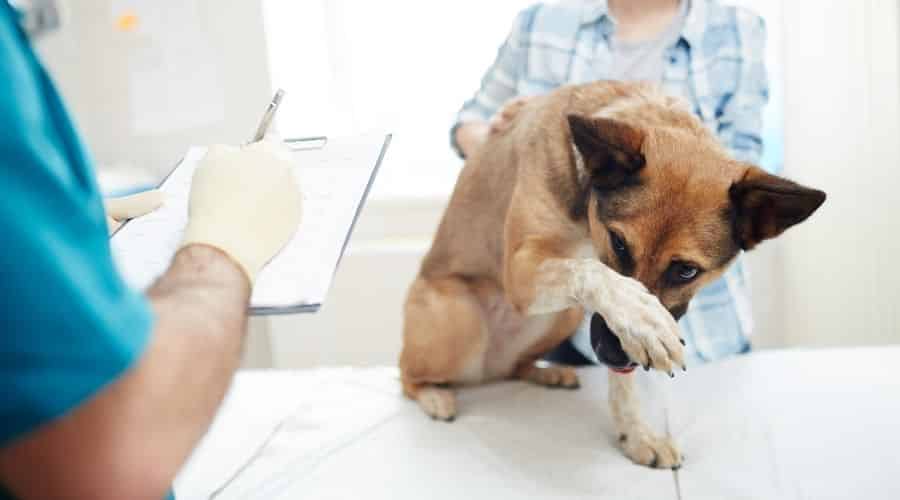
Fix it: See your vet if your dog’s breath changes suddenly or smells unusual. Internal issues can worsen quickly without treatment.
A Vet’s Take: When Bad Breath Means Trouble
If your dog’s breath still smells awful after a good cleaning and diet upgrade, it might be time to call in professional help. Sometimes the problem isn’t surface-level at all.
“Bad dog breath is often a sign of an underlying health problem like dental disease,” says Dr. Hannah Godfrey, BVetMed, MRCVS. “So, it’s important to get advice from a vet before attempting any treatment at home.”
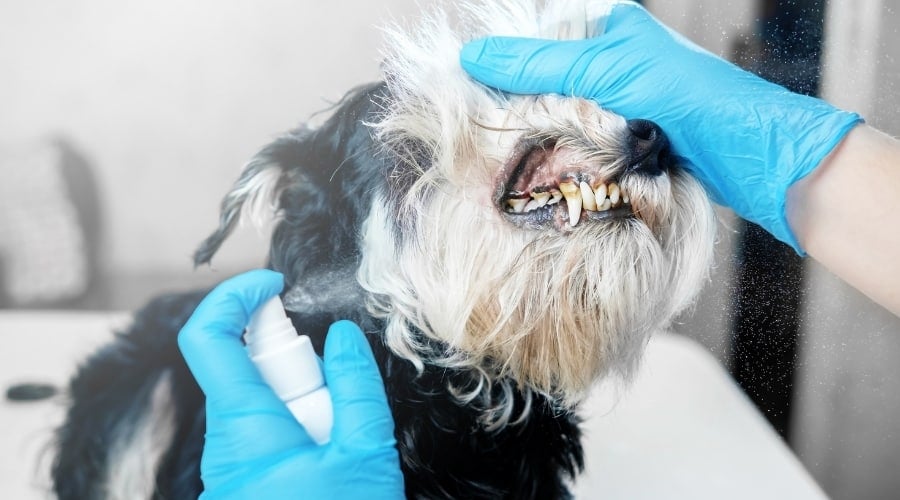
She adds that while most cases are dental-related, not all are.
“The majority of cases of bad breath in dogs that I see in practice turn out to be related to dental disease. However, occasionally, it has been due to kidney disease, wounds in the mouth, ulcers, or other problems,” she says.
Once a vet rules out serious causes, prevention becomes key.
“Mildly bad dog breath can be improved with regular toothbrushing using pet-safe toothpaste. Daily or every other day is best if your dog is tolerant,” says Dr. Godfrey. “If your dog won’t tolerate toothbrushing, there are antibacterial gels, rinses, and water supplements that can improve bad breath, but toothbrushing is most effective.”
Vet’s Note: If your dog’s breath suddenly changes or smells metallic, fishy, or sweet, schedule an exam. These can be signs of more serious issues like kidney or liver disease.
Real-Life Fix: How One Dog Mom Beat “Dragon Breath”
For a while, my little Poogle, Falkor, had breath that could knock you over. I tried everything: daily dental chews, brushing, and even a water additive, but nothing really solved the issue.
Then I realized the problem wasn’t just his teeth. Falkor has a sensitive stomach, and once I switched him to a gentler, vet-recommended diet, the change was almost instant. His tummy calmed down, and with it, the dragon breath disappeared.
Now his breath stays fresh(ish) thanks to a combo of fixes:
- Daily dental chews: Falkor thinks they’re treats. I think of them as breath mints in disguise. His favorite ones are Minties.
- Water additive: A vet-recommended dental rinse that keeps plaque and odor down.
- Brushing (when he lets me): Chicken-flavored toothpaste helps me sneak in a quick brush before he wriggles away.
- Regular vet checks: Just to make sure it’s not a sign of something bigger.
These days, when Falkor leans in for a kiss, I don’t have to hold my breath, and he’s a much happier pup all around.
— Danielle DeGroot, Rescue Dog Mom and Canine Journal Writer
7 Dog Breath Fixes That Actually Work
There’s no shortage of sprays, powders, and pastes promising to end your dog’s dragon breath. Some actually work, while others barely mask the smell. Here are a few that made a real difference for us and our readers.
1. Virbac C.E.T. Enzymatic Dog & Cat Toothpaste Review
Best For: Daily brushing without the foam
Available Flavors: Poultry, malt, seafood, or vanilla mint
Veterinarians often recommend this science-backed toothpaste for reducing plaque and tartar buildup. Its dual-enzyme system works with your dog’s saliva to fight bacteria, prevent tartar, and keep breath fresh.
Since it’s made without foaming agents, it’s safe to swallow, and the pet-approved flavors make brushing much easier.
Quick Takeaway: A vet favorite for a reason. The poultry flavor turns a dreaded task into something your dog might actually enjoy.
Our Personal Experience With Virbac C.E.T. Enzymatic Toothpaste
I was recommended this toothpaste by my pets’ vet, and my dog and two cats absolutely love it. They beg for it like it’s the best treat ever. My dog eagerly waits for his toothbrush, and my cats chew on the brush, which helps get the paste onto their gums.
I use the poultry flavor, so at first their breath smells like, well, chicken. Once that fades, it leaves noticeably cleaner, fresher mouths and whiter teeth.
– Tara Maurer, Animal Lover & Writer For Canine Journal
2. TropiClean Fresh Breath Oral Care Gel Review
Best For: Minty-fresh results without brushing
This gentle tooth gel loosens particles on teeth and helps remove plaque, tartar, and odor-causing bacteria. When used daily, it can noticeably freshen your dog’s breath in 30 days or less.
Apply two drops of gel to each side of your dog’s mouth, and their licking action will spread it across teeth and gums.
It’s made from naturally derived ingredients and contains no sorbitol, sulfates, parabens, dyes, or artificial colors.
Quick Takeaway: A simple, minty gel that delivers fresher breath fast, with no harsh chemicals.
Our Personal Experience With TropiClean Fresh Breath
If you want a product that instantly freshens your pet’s breath, this is it.
I actually use the toothpaste version for my dog. He enjoys the taste, which makes brushing easy and leaves his mouth smelling noticeably minty-fresh right away.
I also, unfortunately, have had the unfortunate experience of cleaning my dog’s mouth after a poop-eating incident. Even that didn’t stand a chance against the minty power of this product.
3. PetHonesty Dental Health Water Additive Review
View on Amazon | View on PetHonesty
Best For: Low-maintenance pet parents
Simply add it to your dog’s water bowl to help reduce plaque, freshen their breath, and combat oral bacteria. It contains natural ingredients such as enzymes, grape seed extract, zinc, cinnamon, and yucca root, and is free of harsh chemicals found in some other dental waters.
Quick Takeaway: A simple, all-natural swap that fits easily into your routine.
4. PlaqueOff Powder Review
Best For: Picky pets
This 100 percent natural kelp powder works with your dog’s body to soften and break down plaque over several weeks. It’s VOHC-approved and vet-recommended, with results typically showing in three to eight weeks.
Research has shown that seaweed, such as kelp, exhibits anti-biofilm activity, which means it can interfere with the bacterial buildup that forms plaque and tartar. Sprinkle a small scoop of it on your dog’s food daily.
Quick Takeaway: The slow and steady fix that delivers visible results.
Personal Experience With PlaqueOff Powder
We started using PlaqueOff with our 3-year-old Cavalier King Charles Spaniel after noticing his bad breath and having to do some dental extractions. We put a small scoop of it sprinkled on his morning meal every day.
The powder doesn’t smell, and he doesn’t seem to notice it since he gobbles his food up on top. We use it in conjunction with brushing his teeth and dental wipes to remove the plaque, and since starting adding this to his daily regimen 4 months ago, we notice that it helps soften up stubborn build-up.
– Sadie Cornelius, Cavalier King Charles Spaniel Dog Mom
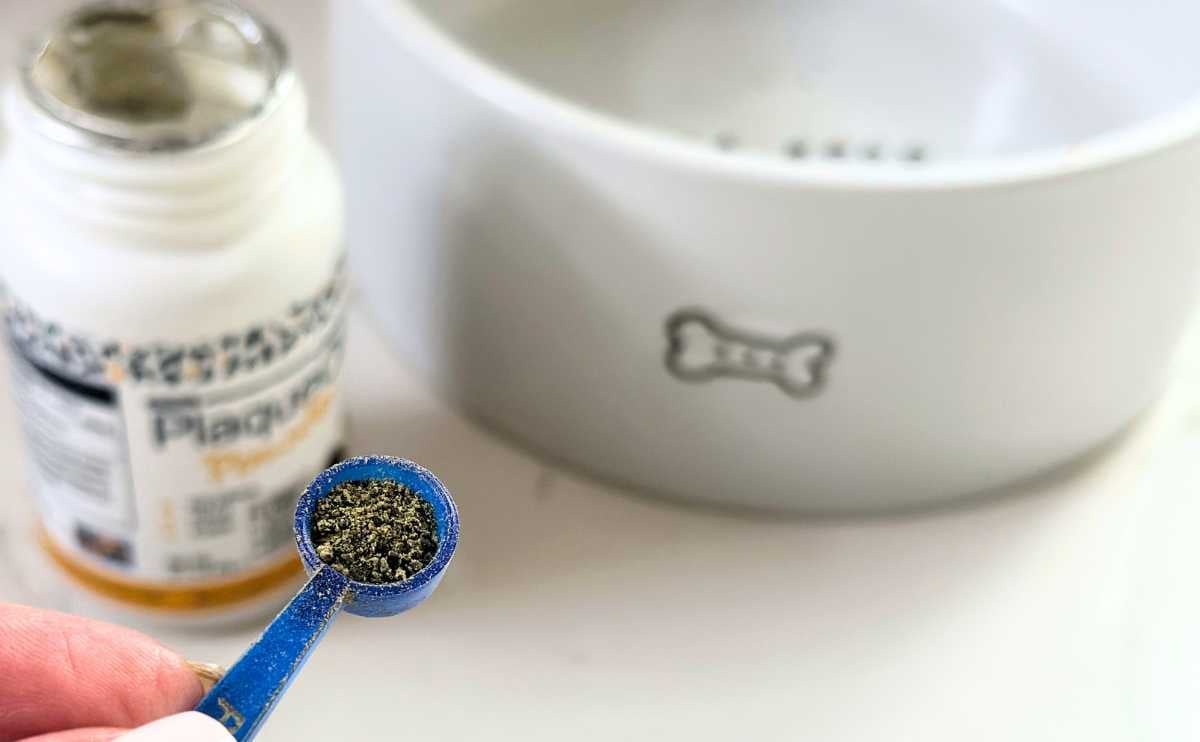
6. PetLab Co. ProBright Advanced Dog Dental Powder
View on Amazon | View on PetLab Co.
Best For: Gradual results with serious impact
This daily dental supplement powder targets the root cause of bad breath and plaque buildup. It contains active ingredients like probiotics, brown algae (Ascophyllum nodosum), sodium hexametaphosphate, rosemary leaf, and decaffeinated green tea, which work together to reduce oral bacteria, fight tartar, and freshen your dog’s breath.
The formula is NASC-certified, meaning it meets strict quality and safety standards set by the National Animal Supplement Council. Clinical testing has shown it can reduce a common bad-breath compound by up to 40 percent in 28 days when used daily.
Quick Takeaway: A science-backed oral supplement that supports dental health from the inside out.
Our Personal Experience with PetLab Co.’s ProBright Dental Powder
Check out this quick video to see how to use the powder (and if our dog liked it).
7. Bark Bright Dental Chews Review
Best For: Dogs who love treats
BarkBox’s Bright Dental Kit combines a chewy treat and toothpaste that work together to clean teeth as your dog chews. Just squeeze a line of the included triple-enzymatic toothpaste into the groove of each chew. The treat’s texture helps remove buildup, while the toothpaste helps neutralize odor-causing bacteria.
Learn more about their system and if it’s a good option for you in our BARK Bright review.
Quick Takeaway: Great for dogs who hate toothbrushes but love snacks. The chew-and-paste combo makes dental care effortless for both pets and owners.
Our Personal Experience With Bark Bright Dental Chews
Bark sent a BARK Bright Dental Kit for my dog, Sally, to test out in exchange for an honest review. The kit includes 30 daily chews and one tube of triple enzymatic toothpaste.
Unlike other dental chews, these are meant to be used with the toothpaste. The dental chew has a groove for you to squeeze a line of toothpaste along the full length. Encouraging your dog to chew the treat can help freshen breath and reduce plaque on your dog’s teeth in just one or two weeks.
Since using these dental chews, Sally’s breath has been unnoticeable, which is how I prefer it. She enjoys the taste of the treat as well. They’re made with real chicken and contain no grains, corn, or soy.
– Kimberly Alt, Rescue Dog Parent & Canine Journal Writer
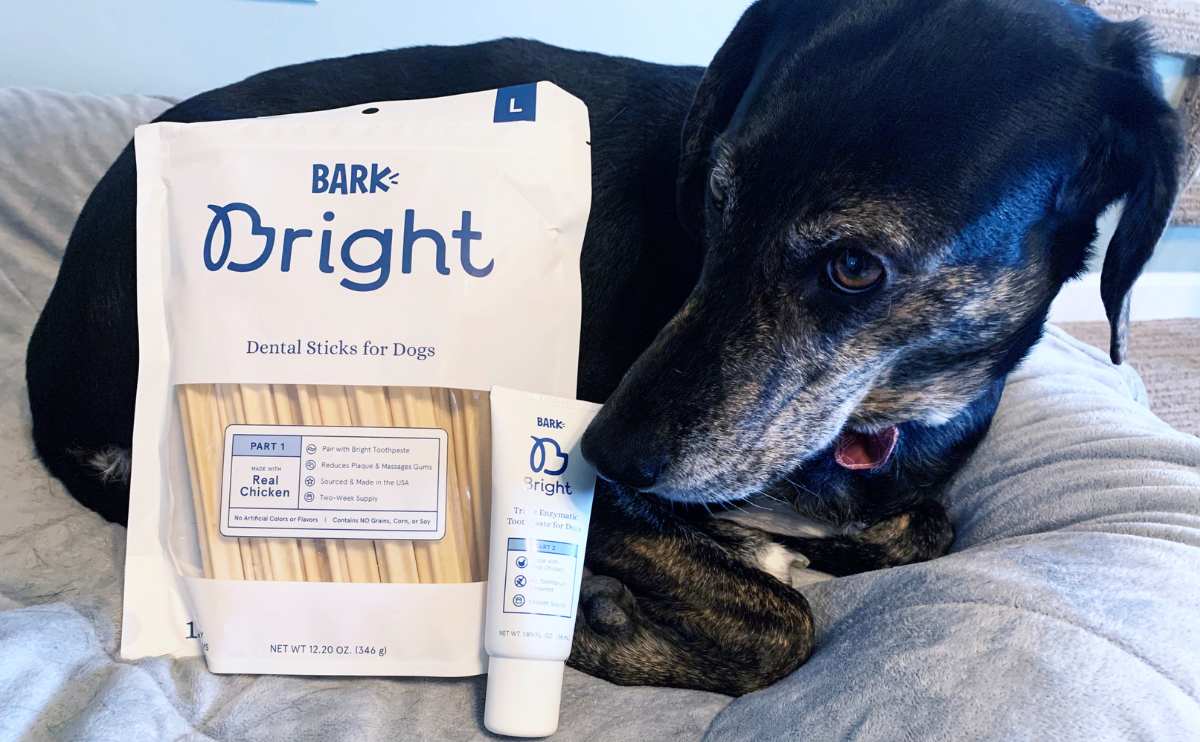
4 DIY Dog Breath Remedies That Don’t Backfire
If you’ve ever searched for quick fixes for bad dog breath, you’ve probably seen all kinds of DIY hacks online. Some of them help, but others can actually make things worse.
Before you reach for the baking soda or peppermint oil, here’s what really works and what to skip.
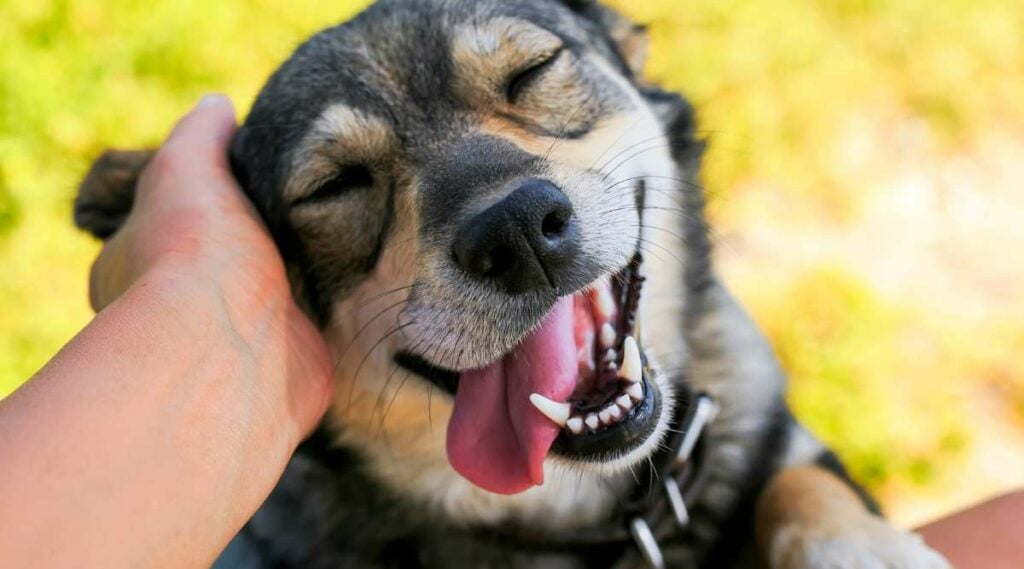
1. Coconut Oil
A small amount of coconut oil can help reduce bacteria in your dog’s mouth while freshening their breath. You can rub a pea-sized amount onto your dog’s teeth or mix a little into their food.
Pro Tip: Start small. Too much can cause stomach upset, especially for smaller dogs.
2. Parsley Or Mint
Fresh herbs aren’t just for garnish. Finely chopped parsley or mint can safely freshen your dog’s breath and provide a dose of antioxidants.
Sprinkle a small pinch over meals for a natural boost.
Avoid: Concentrated essential oils, which can be toxic to pets.
3. Apple Cider Vinegar
Some pet owners add a few drops of apple cider vinegar to their dog’s water bowl to balance mouth bacteria and reduce odor. Always use a light ratio (about half a teaspoon per cup of water) and make sure your dog doesn’t mind the taste.
4. Chlorophyll
Often called “nature’s deodorizer,” chlorophyll can help neutralize odors from the inside out. You’ll find it naturally in leafy greens like spinach and kale, or as a pet-safe supplement powder or liquid.
Some owners mix a few drops into water or food for a fresher-smelling pup.
Quick Takeaway: Homemade remedies can freshen your dog’s breath and support oral health, but they’re not a cure-all. Consistency and safe ingredients matter more than trends.
How To Keep Dog Breath Fresh Long-Term
Most people think bad dog breath is inevitable, but it’s actually one of the easiest pet problems to prevent.
The secret is consistency. A few simple habits can make a huge difference in your dog’s dental health (and the smell of those daily kisses).
1. Schedule Regular Vet Checkups
Your vet can spot oral issues before they turn into serious problems. Bad breath can signal gum disease, tooth decay, or even internal health conditions, so make checkups part of your yearly routine.
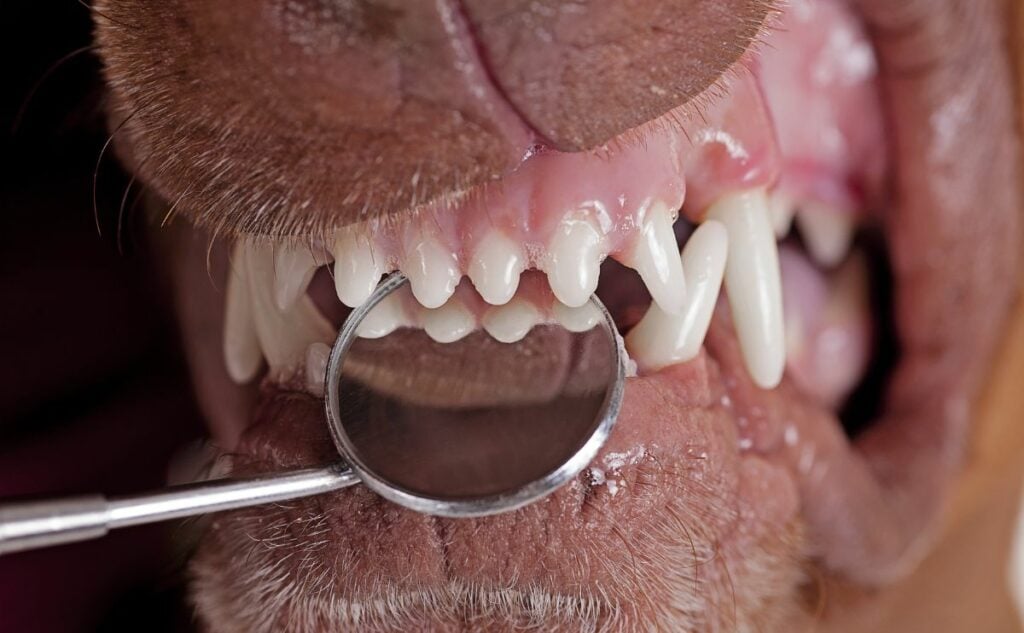
2. Feed High-Quality, Digestible Food
Diet plays a major role in oral health. Choose a high-quality dog food that’s easy to digest and free from low-grade fillers that contribute to plaque and odor.
Dogs with sensitive stomachs often have fresher breath once their digestion improves.
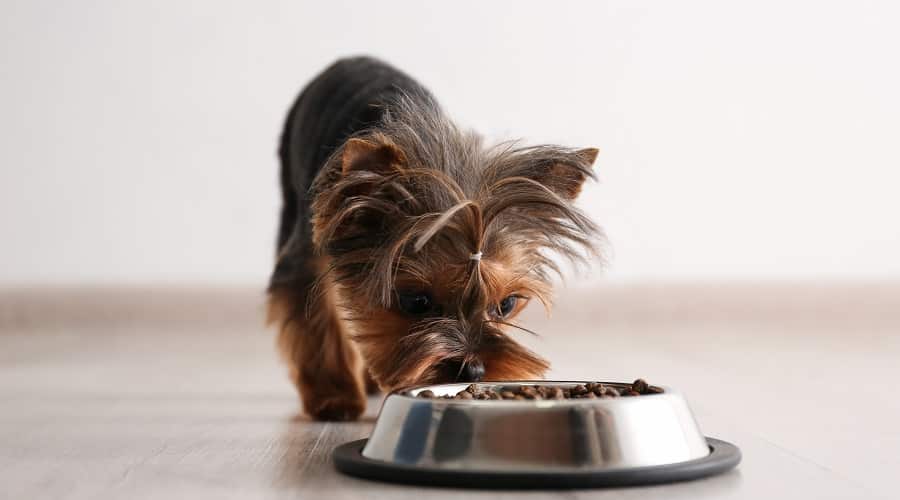
3. Brush Often
Brushing your dog’s teeth every day (or as often as possible) is the single most effective way to prevent bad dog breath. Always use pet-safe toothpaste — human toothpaste can upset your dog’s stomach — and try flavors like poultry or malt if brushing is a battle.
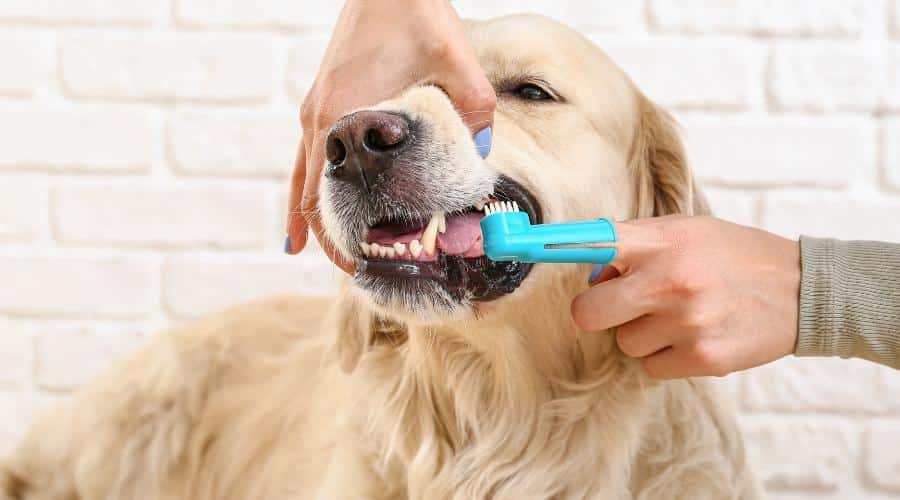
4. Use Dental Chews & Toys
Dental chews and rope toys help scrape away plaque naturally while giving your dog something fun to do. Just make sure the chews are vet-approved and the toys aren’t hard enough to crack teeth.
Skip real bones and antlers, which can cause fractures.
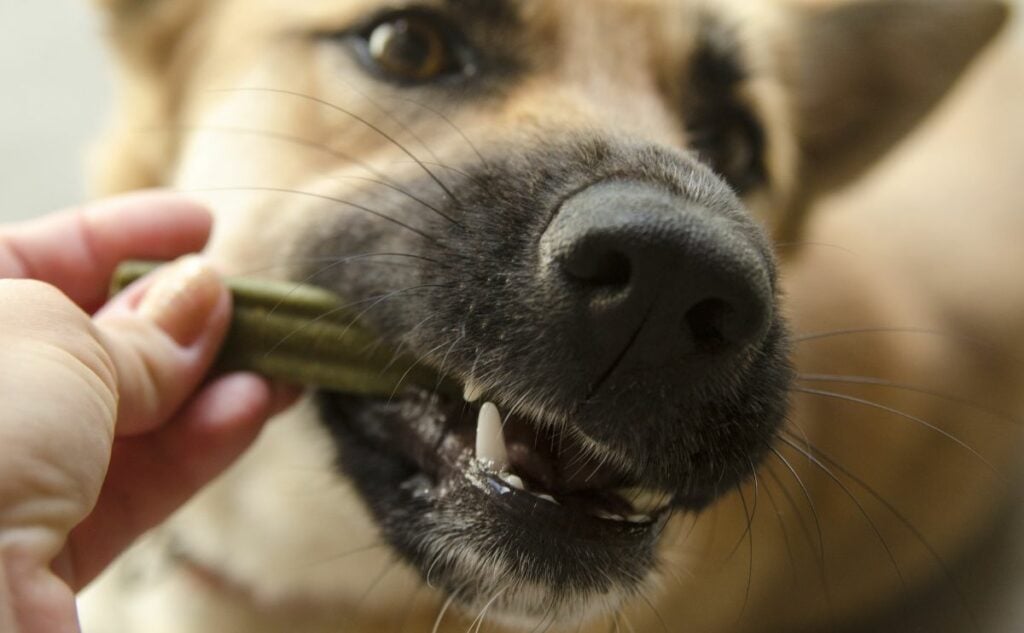
5. Schedule Professional Cleanings
Even with daily brushing, most dogs need a professional dental cleaning once a year. Your vet can remove tartar buildup below the gumline and check for hidden infections that cause bad breath.
Freshness Fact: Brushing and chews handle surface bacteria, but vet cleanings reach what you can’t. Think of them as your dog’s version of a deep-clean dental visit.
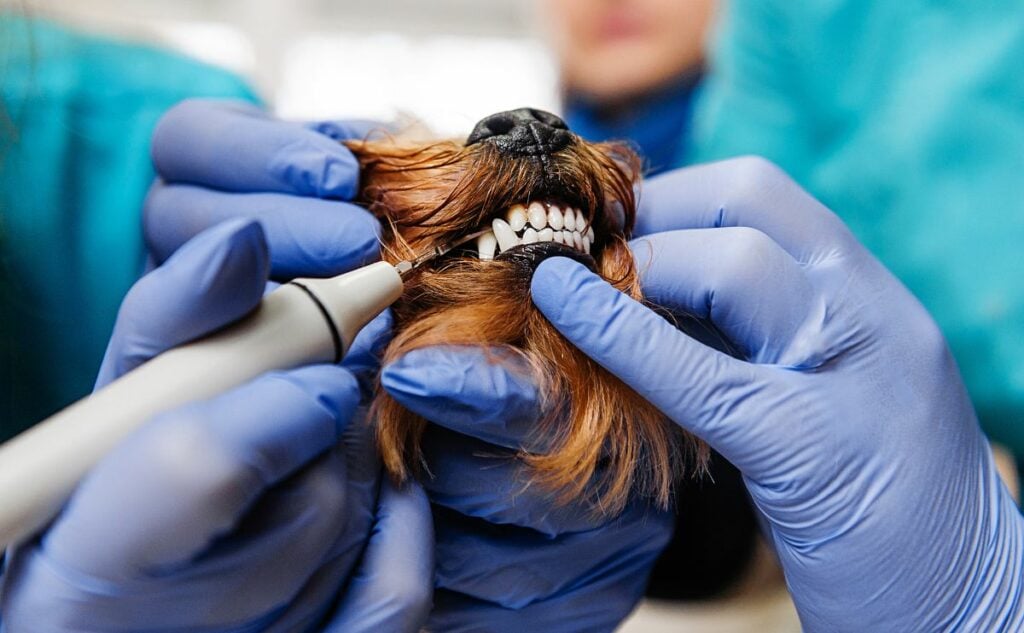
Bonus: If Your Dog Still Smells… It Might Not Be The Mouth
You’ve tackled the brushing, the chews, and every bad dog breath product on the shelf, yet something still stinks. Sometimes, the problem isn’t dental at all. A few other culprits can make your dog smell less than fresh.
1. Ear Infections
Yeast or bacterial infections in the ears can produce a sour or musty odor that lingers even after baths. If your dog is scratching, shaking, or has gunky ears, schedule a vet visit.
2. Skin Issues
Allergies, oily skin, and infections can cause a strong “dog smell.” Regular baths with a gentle, vet-approved shampoo and consistent grooming can help keep odor under control.
3. Anal Glands
If your dog’s odor is fishy or unusually strong, full anal glands might be the cause. Most vets and groomers can safely express them.
Quick Takeaway: If your dog still smells bad after dental care, it’s time to look beyond the mouth.
Frequently Asked Questions
Even the cleanest dogs can have bad breath from time to time. These are some of the most frequently asked questions by pet parents about keeping their dog’s mouth fresh and healthy.
Don’t see your question? Ask us in the comments!
Why Does My Dog’s Breath Smell Like Fish?
A fishy odor is often associated with dental disease or impacted anal glands. If brushing doesn’t solve the issue, ask your veterinarian to check for gum infections or anal gland issues during your next visit.
Can I Use Human Toothpaste On My Dog?
No. Human toothpaste often contains fluoride and xylitol, which are toxic to dogs.
Always use toothpaste formulated for pets, such as poultry- or malt-flavored options designed for daily brushing.
How Often Should I Brush My Dog’s Teeth?
Daily is best, but even brushing a few times a week helps prevent plaque and tartar buildup. Consistency matters more than perfection, so aim for a routine that your dog will tolerate in the long term.
Do Dental Chews Really Work?
Yes, when used regularly. Dental chews help reduce plaque and bacteria between brushings, but they are most effective when used in conjunction with brushing and regular professional cleanings.
When Should I Worry About My Dog’s Bad Breath?
If your dog’s breath suddenly changes or smells unusually sweet, metallic, or rotten, call your vet. These odors can signal deeper issues like diabetes, liver disease, or kidney problems that need prompt care.
Getting Rid Of Your Dog’s Body Odor
Bad dog breath isn’t the only offending odor many pup parents face. Unfortunately, some dogs get smelly even with regular bathing. If this sounds like your pup, you might want to consider getting a pet odor neutralizer that you can apply to your dog’s coat to keep all of your pups smelling fresh.
